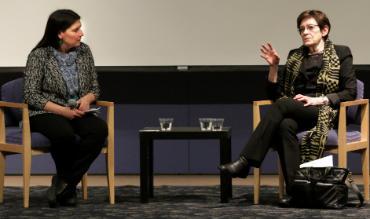
Events
Events
Hosting and supporting events allows us to strengthen our existing community at Seattle University while connecting, collaborating, and supporting Native peoples outside of it. Through the different events we host we are able to educate people on Indigenous topics and issues while celebrating Native peoples and their achievenements
Lushootseed Lecture Series
Indigenous Peoples Institute
Join IPI in learning more about the Lushootseed language, its importance, and what it has to teach us. For additional information, contact Hanna-Marie Lucero by email. Download the flyer.
-
Lecture Dates & Information
-
Past events
January 23
"On Rich Soil"
John LaPointe, MA (Swinomish) & Patrick Twohy, SJ
February 27
"Legend and Legacy"
Jay Miller, Ph.D.
March 26
"Walking in the Footsteps of the Ancestors: Coast Salish Artists"
Barbara Brotherton, Ph.D.
April 23rd
"Living Legends: Lushootseed Stories in My Work and Life"
Crisca Bierwert, Ph.D.
Our visits from the elders have been put on hold until further notice, thank you for understanding.
Elders in Residence Program
Indigenous Peoples Institute
It is important to keep our elders connected to our youth. It is in this relationship that knowledge and traditions are passed down and the stories of resilience and strength can be shared. Each week an elder visits IPI to hang out with students and othes who are coming through the office. They offer advice to the students and participate in projects with them, such as the shawls that were made by students in 2019 and the beading projects that are being worked on currently by students.
-
Elder: Jeanne Raymond
-
Jeanne Raymond, along with other activists, is featured in historian James Gregory's web project entitled Seattle Civil Rights & Labor History Project which includes a substantial section devoted to the experience of urban Indians in Seattle. It is located at the University of Washington.
Jeanne Raymond attended Western Washington College in the late 1960s, where she took classes from Vine Deloria and participated in the American Indian Student Union’s Right to Be Indian Conference. After college, she was recruited to join the American Indian Studies Program at the University of Washington while attending graduate school in Spanish. She taught American Indian Studies courses at Seattle Central Community College. Later, she served as President of the Parent Committee that co-founded Seattle’s American Indian Heritage High School, and worked for the High School as its Assistant Program Manager.
Jeanne loves sharing food and conversation with students and others that happen to be passing through IPI while she visits.
Macheddie, Hanna, and Jeanne helping prepare food for IPI's community dinner.
-
Elder: Sister Julie Codd, Sisters of Saint Joseph of Peace
-
Sister Julie is an artist that has worked with Native groups and is a former director of the Chief Seattle Club. Sister Julie started working with Native communities 38 years ago and in 2012 she received the Gertrude Apel 2012 Pioneering Spirit Award.
Sister Julie enjoys sitting by the fire in IPI while chatting with students.
-
Elder: Father Pat Twohy
-
Father Pat is deeply invested in the Native peoples of the Pacific Northwest and has been living and working with them for over 40 years. He does amazing work supporting the surroundings Native communities and has built strong connections with them. From when he attended Gonzaga University Father Pat received a B.A.and M.A. in English; While attending the Toronto School of Theology he received a Masters in Divinity.
Father Pat attends the Indigenous Student Association meetings and events when he can to show support. He loves talking with the students and enjoys spending time with them whenever he gets the chance.

Annual Events
-
Indigenous Students Visit Day
-
The surrounding Indigenous highschool and transfer students are invited to come visit Seattle University. They receive information about the Indigenous Peoples Institute, the Indigenous Student Association, athletics, academics, and on campus life along with a tour!
-
Since Time Immemorial
-
A yearly conference hosted at Seattle University to create conversation about the Since Time Immemorial curriculum on what it is, its successes, its hardships, and how to better implment the curriculum in classroom settings. This conference is for us to come together and celebrate tribal sovereignty and the reslieince of our people through education.
-
Go Deep with IPI
-
Fundraiser to amplify and honor Indigenous voices and leadership amidst environmental and political change while recognizing Pat Twohy, SJ for his work in community with Native peoples. This fundraiser will benefit the Indigenous Peoples Institute Pat Twohy, SJ Endowment, established to sustain events, academic programs and Indigenous student success at Seattle University
-
Honoring Indigenous Voices
-
Our first annual Honoring Indigenous Voices event focused on intergenerational trauma; specifically surrounding mandated boarding school and residential schools for First Nations and Native American youth in the 19th and 20th centuries. We explored its fall out and continuing effects on Indigenous communities across Canada and the United States.

Past Events
-
April 25, 2019: Environmental issues affecting salmon
-
D.R. Michell, Say' ay' John Sirois, and Todd Mitchell present on the environmental issues affecting salmon, their tribes, and the rivers. After the presentation United By Water screened.
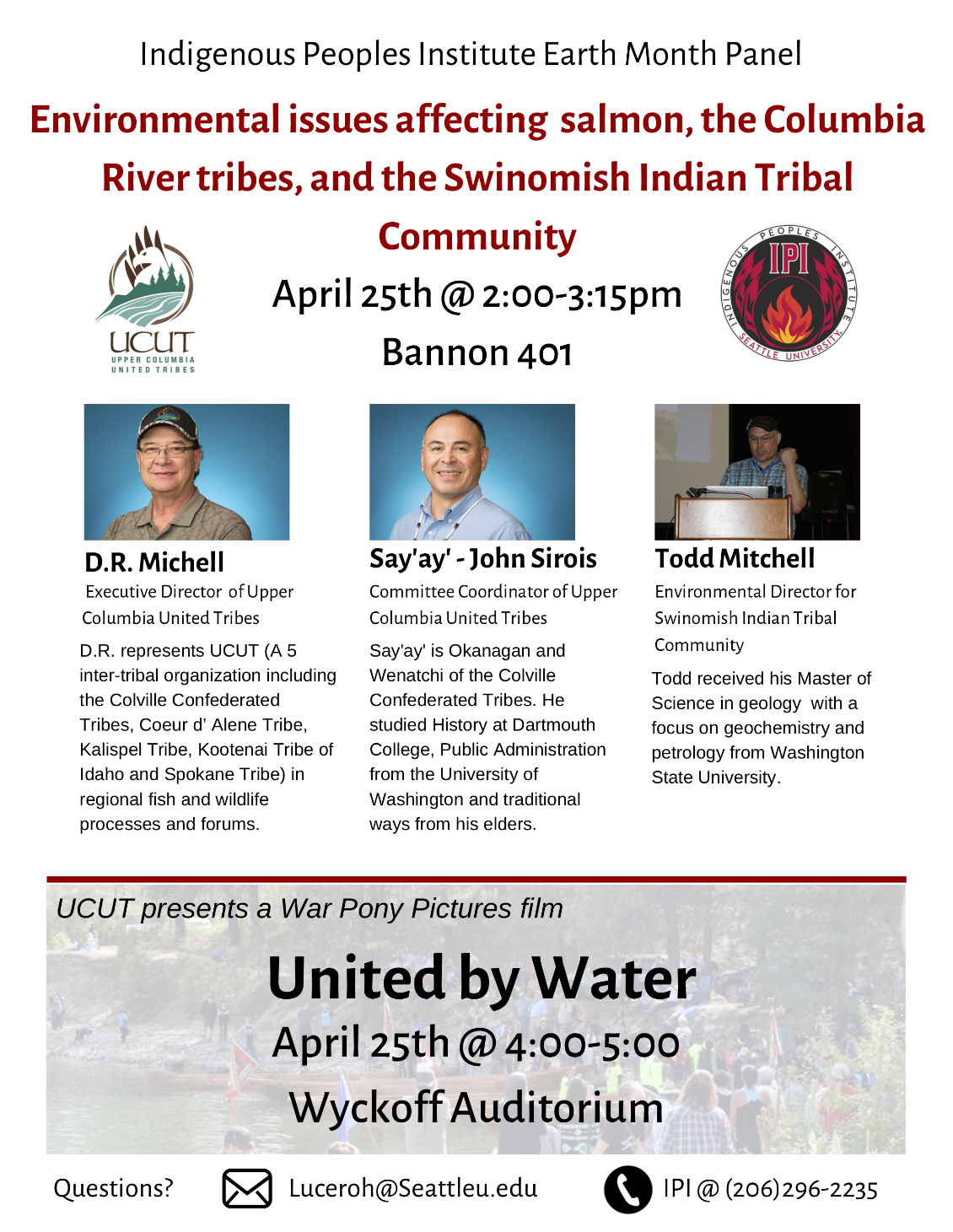
-
January 11, 2019: An Evening with Leanne Betasamosake Simpson
-
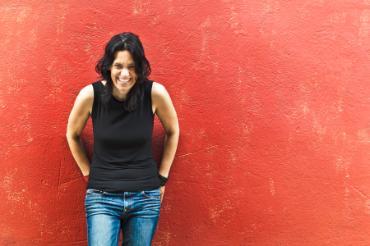
Leanne Betasamosake Simpson is a renowned Michi Saagiig Nishnaabeg scholar, writer and artist, who has been widely recognized as one of the most compelling Indigenous voices of her generation. Her work breaks open the intersections between politics, story and song—bringing audiences into a rich and layered world of sound, light, and sovereign creativity.
Working for over a decade an independent scholar using Nishnaabeg intellectual practices, Leanne has lectured and taught extensively at universities across Canada and has twenty years experience with Indigenous land based education. She holds a PhD from the University of Manitoba, is currently a Distinguished Visiting Scholar in the Faculty of Arts at Ryerson University and faculty at the Dechinta Centre for Research & Learning in Denendeh
-
October 16, 2018: Vi Hilbert Hall Dedication & IPI Open House
-
The newest hall on campus is named after Vi Hilbert, an Upper Skagit elder, who helped revive and preserve the Lushootseed language which is spoken by many Puget Sound peoples.
After the opening and ribbon cutting ceremony in the Vi Hilbert lobby the Indigenous Peoples Institute held an open house to present our, at the time, new office space.
Public Ribbon Cutting Celebration: 1:30-2:00pm
Public Tours: 2:00-3:30pm
IPI Open house: 2:00-3:30pm
Hanna-Marie and Johnny Moses
The Indigenous Peoples Institute space
-
June 2, 2018: White Ravens Documentary Film
-
White Ravens Documentary Film
Northwest Film Forum: Cinema 2 - 6/2/2018
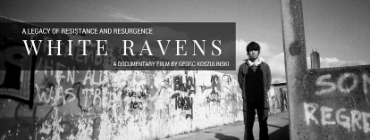
For millennia, the Haida People have lived on the remote islands of Haida Gwaii. From the perspective of a young Haida poet (Towustasin Stocker), White Ravens bears witness to the transgenerational trauma of colonization as survivors, their children, and grandchildren struggle with the effects of substance abuse, suicide, and interfamily trauma.
White Ravens focuses on patterns of resistance, from Towustasin’s family history of blockading corporate logging operations to the Haida Nation’s resurgence of the potlatch—the gift-giving ceremony that remains central to the self-governance of all Coastal First Nations People. On the eve of a historic chieftanship potlatch, the film meditates on the Haida legacy of resistance and resurgence, presenting a portrait of a First Nation community in healing.
Both Georg Koszulinski and Towustasin Stocker were in attendance.
-
October 20, 2017: Nic Low
-
Nic Low is a writer, installation artist and arts organizer of Ngai Tahu Maori and European descent. He divides his time between a hyper-social Melbourne sharehouse, and an anti-social bush retreat. His first book is Arms Race, a collection of fierce, playful short stories out with Text Publishing. He is working on his second, bicultural history of New Zealand’s Southern Alps, told through walking journeys.
Nic Low, Aon, Eddie, and Chandler
-
October 14, 2017: Promised Land Screening
-
"Promised Land is an award-winning social justice documentary that follows two tribes in the Pacific Northwest: the Duwamish and the Chinook, as they fight for the restoration of treaty rights they've long been denied. In following their story, the film examines a larger problem in the way that the government and society still looks at tribal sovereignty." - http://
www.promisedlanddoc.com/ .about/ After screening of the movie a panel was held for Q&A with the film makers.
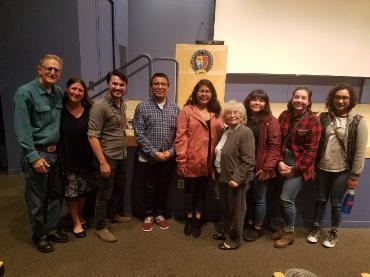
Father Pat, Christina, and students standing with the filmmakers
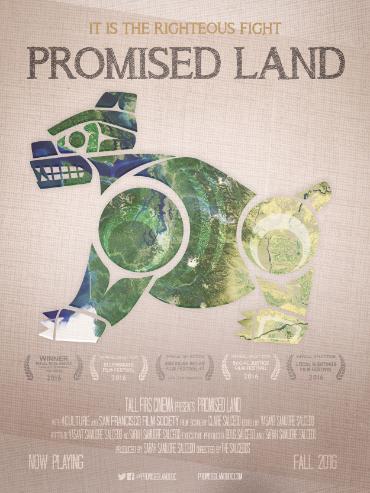
-
February 9, 2017: An Evening With Dr. Roxanne Dunbar-Ortiz
-
"Roxanne Dunbar-Ortiz grew up in rural Oklahoma, daughter of a landless farmer and half-Indian mother. Her paternal grandfather, a white settler, farmer, and veterinarian, had been a labor activist and Socialist in Oklahoma with the Industrial Workers of the World in the first two decades of the twentieth century. The stories of her grandfather inspired her to lifelong social justice activism." - Dr. Dunbar-Ortiz
Roxanne Dunbar-Ortiz is a historian, writer, feminist, and author of Indigenous Peoples’ History of the United States which is her fifth book. Dr. Dunbar-Ortiz presented "Follow the Corn: North America in 1491" in Pigott auditorium. After the presentaiton Dr. Christina Roberts, IPI Director, interviewed Dr. Dunbar-Ortiz.
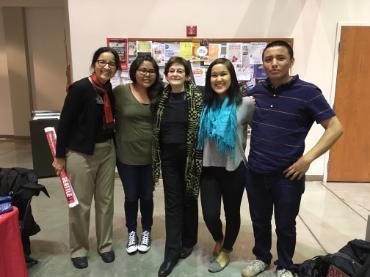
Diane, Aeon, Dr. Dunbar-Ortiz, Hilary and Chandler
Christina and Dr. Dunbar-Ortiz
Contact Us
Email address
Office number
206-296-2235
Mailing address
Seattle University
Indigenous Peoples Institute
901 12th Avenue
P.O. Box 222000
Seattle, WA 98122-1090
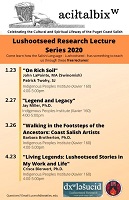
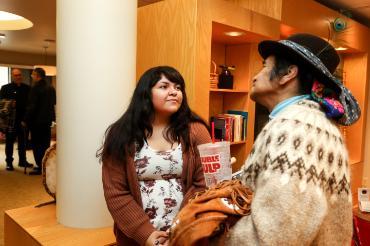

-303x404.JPG)
